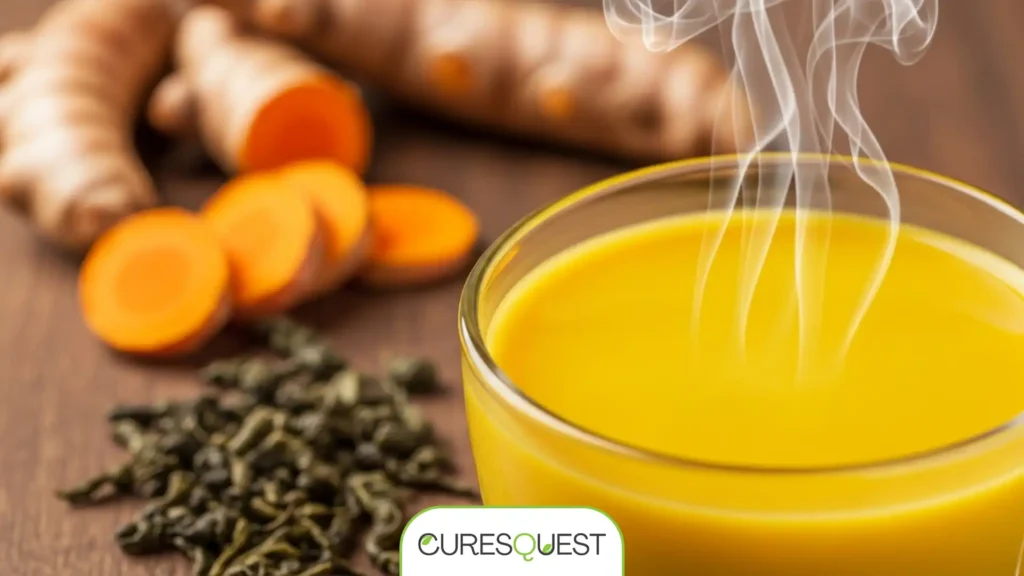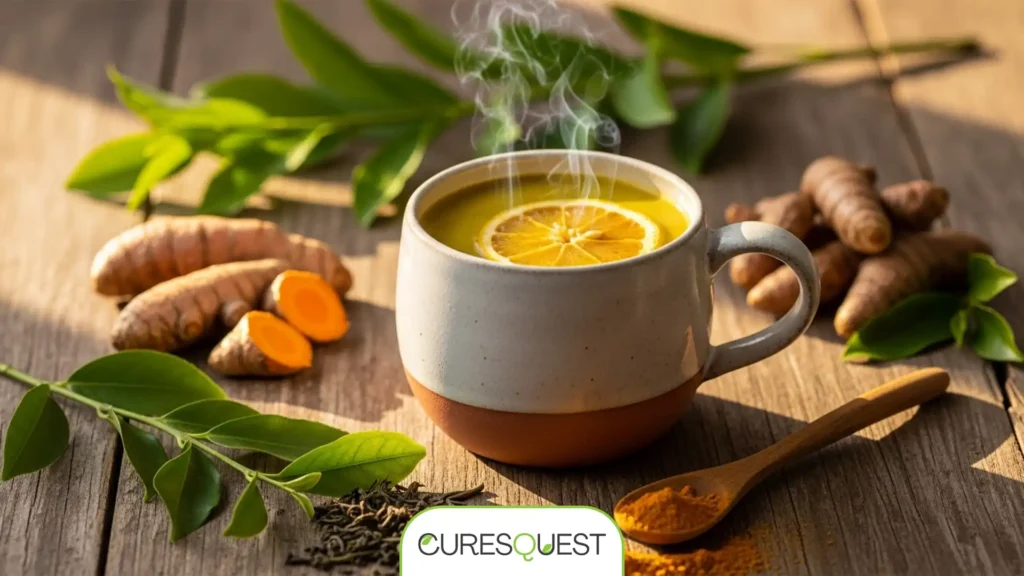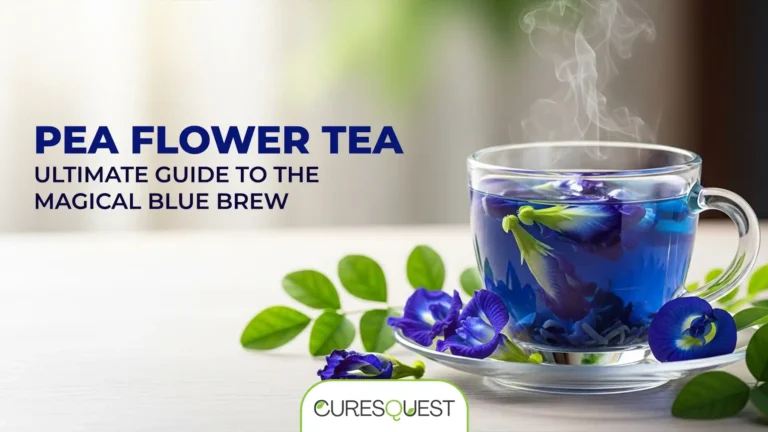In the vast world of wellness, certain combinations stand out for their exceptional health-promoting properties. Among these, turmeric green tea has emerged as a true golden elixir, blending the ancient wisdom of two powerful ingredients into a single, potent brew. Imagine starting your day with a comforting, aromatic cup that not only invigorates your senses but also actively works to enhance your well-being from the inside out. This isn’t just a beverage; it’s a daily ritual steeped in benefits.
For centuries, both turmeric and green tea have been revered in traditional medicine for their profound healing capabilities. Turmeric, the vibrant golden spice, is celebrated for its active compound, curcumin, a powerhouse of anti-inflammatory and antioxidant effects. Green tea, on the other hand, is a cornerstone of healthy living, rich in catechins like EGCG, known for boosting metabolism and protecting against cellular damage. When these two titans of health unite, their individual strengths are amplified, creating a synergistic blend that offers a comprehensive spectrum of advantages for your body and mind.
This comprehensive guide will delve deep into the world of turmeric green tea, exploring its remarkable health benefits, guiding you through the art of brewing the perfect cup, and offering practical advice on how to seamlessly integrate this golden beverage into your daily routine. Prepare to uncover why this simple yet profound concoction is much more than just a trendy drink—it’s a testament to nature’s incredible ability to support and sustain vibrant health. Let’s embark on a journey to discover the golden goodness that awaits in every sip.

Table of Contents
The Dynamic Duo: What Makes Turmeric Green Tea So Potent?
The magic of turmeric green tea lies in the combined forces of its two primary ingredients. Separately, they are formidable; together, they create a health-boosting synergy that is truly remarkable. Understanding the individual contributions of green tea and turmeric, and how they enhance each other, is key to appreciating the full potential of this golden brew.
Green Tea: A Legacy of Wellness
Green tea, derived from the Camellia sinensis plant, has been cherished for millennia, particularly in East Asian cultures, not just as a beverage but as a vital component of traditional medicine. Its unfermented leaves retain a high concentration of beneficial compounds, most notably polyphenols called catechins. Among these, epigallocatechin gallate (EGCG) is the star, responsible for many of green tea’s well-documented health benefits. EGCG is a powerful antioxidant, capable of neutralizing harmful free radicals that contribute to aging and disease. Beyond its antioxidant prowess, green tea is known to support cardiovascular health, aid in weight management by boosting metabolism, and even improve brain function due to its L-theanine content, which promotes a calm yet alert state.
Turmeric: The Golden Spice of Life
Turmeric, a rhizome from the ginger family, is perhaps best known for its vibrant yellow-orange color and its central role in Indian cuisine. However, its reputation as a medicinal spice predates its culinary use, with thousands of years of application in Ayurvedic and Chinese medicine. The primary active compounds in turmeric are curcuminoids, with curcumin being the most studied and potent. Curcumin is celebrated for its extraordinary anti-inflammatory properties, rivaling those of some pharmaceutical drugs without the associated side effects. It’s also a potent antioxidant, and research suggests it may play a role in supporting brain health, fighting chronic diseases, and even promoting skin vitality. However, curcumin’s bioavailability on its own is low, meaning the body struggles to absorb and utilize it effectively—a challenge that the addition of green tea can indirectly help address.
The Synergy: Why They’re Better Together
The combination of turmeric and green tea creates a synergistic effect where the benefits of each ingredient are potentially amplified. This isn’t merely two healthy ingredients mixed; it’s a biochemical partnership. Green tea’s catechins and turmeric’s curcuminoids are both potent antioxidants and anti-inflammatory agents. When consumed together, they can offer a broader spectrum of protection against oxidative stress and chronic inflammation, which are root causes of many modern diseases.

Moreover, some research suggests that certain compounds in green tea might help improve the absorption of curcumin, even without the traditional addition of black pepper (piperine). This makes turmeric green tea an exceptionally efficient way to deliver these beneficial compounds to your body. The combined effect means you’re not just getting the benefits of green tea and the benefits of turmeric; you’re getting a boosted, more comprehensive wellness experience that targets multiple pathways for improved health.
If you want to dive deeper into the research, see the full study on PubMed Central.
A Deep Dive into the Health Benefits of Turmeric Green Tea
The fusion of turmeric and green tea isn’t just delightful to the palate; it’s a powerhouse for your health, offering a wide array of scientifically backed benefits. From combating inflammation to boosting brain power, turmeric green tea is a versatile elixir that supports nearly every system in your body. Let’s explore some of the most compelling advantages of making this golden brew a regular part of your wellness regimen.
Potent Anti-Inflammatory Power
Chronic inflammation is a silent enemy, contributing to a host of debilitating conditions including heart disease, diabetes, arthritis, and certain cancers. Both curcumin from turmeric and EGCG from green tea are renowned for their potent anti-inflammatory properties. Curcumin works by inhibiting several molecules known to play major roles in inflammation, while EGCG helps to modulate inflammatory responses. Together, they provide a formidable defense, making turmeric green tea for inflammation a natural and effective remedy. Regular consumption can help reduce systemic inflammation, alleviating symptoms of inflammatory conditions and potentially preventing their onset. This makes it a fantastic choice for those seeking natural ways to manage discomfort and promote healing.
Antioxidant Overload: Fighting Free Radicals
Our bodies are constantly under attack from free radicals, unstable molecules that cause oxidative stress, leading to cellular damage and accelerating aging. Turmeric green tea is an antioxidant powerhouse, rich in compounds that scavenge these harmful free radicals. Curcumin is a strong antioxidant, and EGCG is considered one of the most powerful antioxidants known. This dual action provides comprehensive cellular protection, safeguarding your DNA, proteins, and lipids from oxidative damage. By reducing oxidative stress, this golden tea can help prevent chronic diseases, enhance cellular repair, and contribute to overall longevity and vitality. It’s a simple, delicious way to arm your body against environmental stressors and internal wear and tear.
Boosting Your Immune System
A robust immune system is your body’s first line of defense against infections and illnesses. Turmeric green tea offers significant immune-boosting properties. Green tea catechins have been shown to enhance the function of T-cells, a type of white blood cell crucial for immune response. Curcumin, on the other hand, acts as an immunomodulator, helping to regulate immune cell activity and prevent overactive or underactive immune responses. Together, these ingredients strengthen your immune system, making you more resilient to colds, flu, and other pathogens. Incorporating this tea into your routine, especially during colder months or times of stress, can provide an extra layer of protection and help maintain your overall health.
Supporting Digestive Health
A healthy gut is fundamental to overall well-being, influencing everything from nutrient absorption to mood. Digestive health turmeric green tea can play a supportive role in maintaining a balanced digestive system. Green tea has mild antimicrobial properties that can help maintain a healthy gut microbiome, while turmeric is known for its ability to stimulate bile production, which aids in fat digestion. Curcumin also has anti-spasmodic properties that can help soothe an irritated gut. Regular consumption can alleviate symptoms of indigestion, bloating, and gas, promoting smoother digestion and nutrient absorption.

This gentle yet effective blend can be a comforting addition for anyone looking to nurture their gut health.
Enhancing Brain Function and Mood
The benefits of turmeric green tea extend beyond physical health to cognitive function and emotional well-being. Green tea contains L-theanine, an amino acid known to cross the blood-brain barrier, inducing a calm and focused state without drowsiness. It can improve attention, memory, and cognitive performance. Curcumin has also shown promise in neuroprotection, with studies suggesting it may improve memory and mood by increasing brain-derived neurotrophic factor (BDNF), a growth hormone that functions in the brain. The combination offers a natural way to enhance mental clarity, reduce anxiety, and potentially protect against age-related cognitive decline. It’s the perfect beverage for a productive workday or a moment of mindful reflection.

Promoting Heart Health
Cardiovascular disease remains a leading cause of mortality worldwide, making heart health a critical focus. Heart health turmeric green tea contributes to a healthy heart through multiple mechanisms. Green tea has been shown to improve cholesterol levels, particularly by reducing LDL (bad) cholesterol and increasing HDL (good) cholesterol. It also helps to improve blood vessel function and reduce blood pressure. Curcumin supports heart health by improving endothelial function, the lining of your blood vessels, and by reducing inflammation and oxidative stress, both of which are major contributors to heart disease. This powerful duo helps maintain arterial health, regulate blood pressure, and reduce the risk factors associated with cardiovascular issues, making it a truly heart-friendly beverage.
Aiding in Weight Management
For those on a journey towards a healthier weight, weight loss with turmeric green tea can be a valuable ally. Green tea is well-known for its metabolism-boosting properties, primarily due to its EGCG content, which helps increase fat oxidation. Curcumin may also play a role in weight management by reducing inflammation associated with obesity and potentially inhibiting the growth of fat cells. While not a magic bullet, incorporating this tea into a balanced diet and exercise routine can support your efforts to shed excess pounds, improve body composition, and maintain a healthy metabolism. It’s a natural, calorie-free way to give your body an extra edge.
Skin Health and Radiance
The benefits of turmeric green tea aren’t just internal; they can manifest externally through improved skin health. Both turmeric and green tea are rich in antioxidants and anti-inflammatory compounds that combat the root causes of many skin issues. Green tea can help protect the skin from UV damage, reduce redness, and improve elasticity. Curcumin’s anti-inflammatory and antiseptic properties can help soothe skin conditions like acne, eczema, and psoriasis, promoting a clearer, more radiant complexion. By reducing oxidative stress and inflammation, this golden beverage contributes to a healthy glow from within, making your skin look and feel its best.
Potential Anti-Cancer Properties
While more research is always ongoing, the potential anti-cancer properties of turmeric green tea are a significant area of interest. Both curcumin and EGCG have been extensively studied for their abilities to inhibit the growth of cancer cells, induce apoptosis (programmed cell death) in cancerous cells, and prevent metastasis. They can also protect healthy cells from damage. While this tea should never be considered a standalone treatment, its regular consumption as part of a healthy lifestyle may contribute to cellular protection and reduce the risk of certain cancers. This profound benefit underscores the incredible power packed into each cup.
How to Make the Perfect Turmeric Green Tea (Recipes & Tips)
Brewing your own turmeric green tea is a simple yet rewarding process. The beauty of it lies in its versatility—you can tailor the flavor and potency to your liking. Here’s how to create the perfect cup, along with some delicious variations.

Basic Turmeric Green Tea Recipe
This simple recipe is your starting point for enjoying the incredible benefits of this golden elixir.
Ingredients:
- 1 teaspoon loose leaf green tea or 1 green tea bag
- 1/2 teaspoon ground turmeric (or 1/2 inch fresh turmeric root, grated)
- 1 cup hot water (ideally 175-180°F or 80-82°C)
- Optional: a pinch of black pepper (enhances curcumin absorption)
- Optional: honey or lemon to taste
Instructions:
- Heat Water: Bring fresh, filtered water to just below boiling. Green tea is delicate, so avoid boiling water, which can make it bitter.
- Combine Ingredients: In a mug, place your green tea and ground turmeric. If using fresh turmeric, add it now. Add a tiny pinch of black pepper if desired for enhanced curcumin absorption.
- Steep: Pour the hot water over the ingredients.
- Infuse: Let it steep for 3-5 minutes. For a stronger flavor, you can steep longer, but be mindful that green tea can become bitter with over-steeping.
- Strain & Serve: Strain the tea to remove the leaves and turmeric pulp (if using fresh). Add honey or a squeeze of lemon if desired. Enjoy your homemade golden green tea recipe!
Variations and Enhancements
Elevate your turmeric green tea preparation with these delicious additions:
- Ginger Zest: Add 1/2 inch of grated fresh ginger along with the turmeric for an extra spicy kick and additional anti-inflammatory benefits. This creates a delightful green tea with turmeric and ginger.
- Black Pepper Boost: As mentioned, a tiny pinch of black pepper (piperine) significantly increases the bioavailability of curcumin, making the turmeric more effective. Don’t skip this if you’re focused on maximizing benefits.
- Lemon or Honey: A squeeze of fresh lemon brightens the flavor and adds Vitamin C. A drizzle of honey or maple syrup can sweeten the tea naturally.
- Spiced Golden Green Tea: For a more complex flavor, add a small cinnamon stick or a couple of cardamom pods during steeping.
- Iced Turmeric Green Tea: Prepare a stronger brew, let it cool, then pour over ice. Add extra lemon or mint for a refreshing summer drink.
Brewing Tips for Optimal Flavor and Benefits
- Water Quality: Use filtered water for the best taste.
- Temperature Control: For green tea, aim for water that is hot but not boiling (175-180°F or 80-82°C). This prevents scorching the delicate tea leaves and preserves their nuanced flavor.
- Steeping Time: 3-5 minutes is generally ideal. Experiment to find your preferred strength.
- Fresh vs. Ground Turmeric: Fresh turmeric offers a brighter, earthier flavor, while ground turmeric is more convenient. Both are effective.
- Organic Ingredients: Whenever possible, opt for organic green tea and turmeric to avoid pesticides and ensure higher quality.
For more details, see the full recipe on the BBC.
Integrating Turmeric Green Tea into Your Daily Routine
Making turmeric green tea a consistent part of your day is easier than you think. Its versatility allows it to fit into various moments, offering both health benefits and a moment of mindful enjoyment.
Best Time to Drink Turmeric Green Tea
The best time to drink turmeric green tea largely depends on your personal preferences and sensitivities. Many people enjoy it:
- In the Morning: As a gentle, invigorating start to the day. The mild caffeine from green tea provides a natural energy boost without the jitters often associated with coffee, while L-theanine promotes focus.
- Mid-Morning/Afternoon: As a healthy pick-me-up to combat the afternoon slump. It can help maintain focus and ward off cravings for less healthy snacks.
- Before Meals: Some find it aids digestion when consumed about 30 minutes before a meal.
- After Workouts: Its anti-inflammatory properties can help with muscle recovery.
Avoid drinking it too close to bedtime if you are sensitive to caffeine, as green tea does contain some. However, the L-theanine can counteract the stimulating effects for many, leading to a calm alertness rather than restlessness.
Considerations for Consumption
- Consistency is Key: Like any natural remedy, the benefits of turmeric green tea are most pronounced with regular, consistent consumption. Aim for 1-3 cups daily to experience its full potential.
- Listen to Your Body: While generally safe, everyone’s body reacts differently. If you experience any discomfort, adjust your intake or consult a healthcare professional.
- Hydration: While tea contributes to your fluid intake, remember to also drink plenty of plain water throughout the day.
Navigating the Market: Choosing the Best Turmeric Green Tea Products
As the popularity of turmeric green tea grows, so does the variety of products available. Knowing what to look for can help you choose the best quality and most beneficial options.
Loose Leaf vs. Tea Bags
- Loose Leaf: Often considered superior in quality, loose leaf green tea typically offers a fuller flavor profile and more potent health benefits as the leaves have more room to expand and release their compounds. When combined with high-quality ground or fresh turmeric, this is often the preferred choice for connoisseurs and health enthusiasts.
- Tea Bags: Convenient for on-the-go, but quality can vary greatly. Look for tea bags that use whole leaf green tea and contain actual turmeric, not just ‘turmeric flavor.’ Pyramid-shaped bags can sometimes allow for better infusion than traditional flat bags.
Organic and Quality Sourcing
Opting for organic turmeric green tea is highly recommended. Organic certification ensures that the green tea leaves and turmeric root are grown without synthetic pesticides, herbicides, or fertilizers. This not only benefits your health by avoiding chemical residues but also supports sustainable farming practices. Look for certifications from reputable organizations. Additionally, consider the origin of the ingredients; some regions are known for producing higher quality green tea and turmeric.
Ingredients to Look For (and Avoid)
When reviewing product labels, aim for simplicity. The best products will primarily list green tea and turmeric (or curcumin extract). Some blends may include ginger, black pepper, or natural flavorings, which can be beneficial or benign. Be wary of products with:
- Artificial Flavors: These offer no health benefits and can detract from the natural goodness.
- Excessive Sweeteners: Sugary additions can negate some of the health benefits.
- Fillers: Unnecessary ingredients that dilute the potency.
Always check the ingredient list to ensure you’re getting a pure and potent product that aligns with your health goals.
| Component | Key Active Compounds | Primary Benefits in Turmeric Green Tea | Quality Considerations |
|---|---|---|---|
| Green Tea | EGCG, L-theanine, Catechins | Antioxidant, metabolism boost, brain function, heart health | Organic, loose leaf, specific origin (e.g., Japanese Sencha, Chinese Dragonwell) |
| Turmeric | Curcuminoids (Curcumin) | Potent anti-inflammatory, antioxidant, digestive support, immune modulator | Organic, high curcumin content, fresh vs. dried/ground |
| Black Pepper (optional) | Piperine | Significantly enhances curcumin absorption | Small pinch, freshly ground preferred |
| Ginger (optional) | Gingerol | Adds anti-inflammatory, digestive, and warming properties | Freshly grated, organic |
| Lemon (optional) | Vitamin C, Antioxidants | Brightens flavor, boosts immunity, aids iron absorption | Freshly squeezed, organic |
Potential Side Effects and Precautions
While turmeric green tea is generally considered safe and beneficial for most people, it’s important to be aware of potential side effects and precautions, especially if consumed in large quantities or if you have pre-existing health conditions.
Dosage and Interactions
- Caffeine Sensitivity: Green tea contains caffeine. If you are sensitive to caffeine, consuming large amounts, especially in the afternoon or evening, might lead to restlessness, insomnia, or jitters. Opt for decaffeinated green tea if this is a concern.
- Iron Absorption: Green tea catechins can inhibit the absorption of non-heme iron (iron from plant sources). If you are prone to iron deficiency, consider drinking your turmeric green tea between meals rather than with them, or consume it with a source of Vitamin C (like lemon) which enhances iron absorption.
- Blood Thinners: Both turmeric and green tea have mild blood-thinning properties. If you are taking anticoagulant medications (blood thinners) like warfarin, consult your doctor before regularly consuming large amounts of this tea, as it could potentially increase the risk of bleeding.
- Medication Interactions: Turmeric and green tea can interact with certain medications, including those for diabetes, blood pressure, and chemotherapy drugs. Always discuss with your healthcare provider if you are on medication and plan to significantly increase your intake of herbal supplements.
Who Should Exercise Caution?
- Pregnant or Breastfeeding Women: Due to limited research on high doses of turmeric and green tea during pregnancy and lactation, it’s best to consult a doctor before regular consumption.
- Individuals with Gallbladder Issues: Turmeric can stimulate bile production, which might exacerbate issues for individuals with gallstones or bile duct obstructions.
- People Undergoing Surgery: Due to its blood-thinning effects, it’s often advised to discontinue turmeric green tea several weeks before scheduled surgery.
- Those with Kidney Stones: Green tea contains oxalates, which can contribute to kidney stone formation in susceptible individuals.
Always prioritize speaking with a healthcare professional if you have any concerns or underlying health conditions before making significant dietary changes, including the regular consumption of turmeric green tea.
Turmeric Green Tea vs. Other Popular Health Drinks
With so many wellness beverages available, how does turmeric green tea stack up against other popular choices? Understanding its unique position can help you choose the best drink for your specific health goals.

Turmeric Green Tea vs. Coffee
Many people reach for coffee for its stimulating effects, but turmeric green tea vs coffee presents an interesting comparison:
- Caffeine Content: Coffee generally has a much higher caffeine content than green tea. While coffee provides an immediate jolt, green tea offers a more sustained, calmer energy boost due to L-theanine, which modulates caffeine’s effects.
- Antioxidants: Both are rich in antioxidants, but they offer different profiles. Coffee provides chlorogenic acids, while green tea is renowned for its catechins (EGCG). Turmeric green tea adds curcumin’s potent antioxidant power, offering a broader spectrum.
- Inflammation: Coffee can sometimes be pro-inflammatory for sensitive individuals, especially if consumed with sugar and artificial creamers. Turmeric green tea is decidedly anti-inflammatory, making it a better choice for those managing inflammatory conditions.
- Digestive Impact: Coffee can be acidic and may cause digestive upset or heartburn in some. Turmeric green tea is generally gentler on the stomach and can even support digestive health.
For a sustained, calm energy and powerful anti-inflammatory benefits, turmeric green tea is often the preferred choice over coffee, especially for those looking to reduce their caffeine intake or support overall wellness.
Turmeric Green Tea vs. Plain Green Tea
Plain green tea is undeniably healthy, but the addition of turmeric elevates its benefits:
- Anti-inflammatory Power: While green tea has anti-inflammatory properties, turmeric brings a significant boost, primarily due to curcumin. This makes turmeric green tea for inflammation a superior choice.
- Antioxidant Spectrum: The combination offers a wider range of antioxidants, providing more comprehensive protection against oxidative stress.
- Specific Benefits: Turmeric adds specific benefits like enhanced digestive health, potential pain relief, and unique neuroprotective qualities that plain green tea alone may not provide as strongly.
Essentially, turmeric green tea takes the already impressive benefits of green tea and amplifies them, creating a more potent wellness beverage.
Turmeric Green Tea vs. Golden Milk (Turmeric Latte)
Golden milk, a traditional Ayurvedic beverage, is a warm, spiced milk drink typically made with turmeric, ginger, and other spices, often with black pepper and a sweetener. While both are golden and feature turmeric, they are distinct:
- Base: Golden milk uses a milk base (dairy or plant-based), while turmeric green tea uses a green tea base.
- Caffeine: Golden milk is caffeine-free, making it an excellent evening drink. Turmeric green tea contains caffeine from the green tea.
- Nutrient Profile: Golden milk often provides healthy fats from the milk and spices, while turmeric green tea focuses on the water-soluble compounds from tea and turmeric.
- Best Use: Golden milk is often enjoyed as a soothing, pre-bedtime ritual. Turmeric green tea can be enjoyed throughout the day for energy, focus, and broad health benefits.
Both are excellent choices for incorporating turmeric into your diet, but they serve different purposes and offer different experiences. The choice between them often comes down to timing, caffeine preference, and desired flavor profile.
Frequently Asked Questions (FAQ)
What is the best time of day to drink turmeric green tea?
The best time to drink turmeric green tea is often in the morning or mid-afternoon. The green tea provides a gentle caffeine boost and L-theanine for focused energy, making it ideal for starting your day or overcoming an afternoon slump. If you’re sensitive to caffeine, avoid drinking it too close to bedtime. Some people also find it beneficial to drink about 30 minutes before a meal to aid digestion.
Can turmeric green tea help with weight loss?
Yes, turmeric green tea can be a supportive addition to a weight management plan. Green tea’s EGCG is known to boost metabolism and increase fat oxidation, while turmeric’s curcumin may help reduce inflammation associated with obesity and inhibit fat cell growth. When combined with a balanced diet and regular exercise, it can contribute to healthier weight maintenance.
Are there any side effects of drinking turmeric green tea daily?
For most healthy individuals, daily consumption of turmeric green tea is safe. However, potential side effects can include mild caffeine sensitivity (insomnia, jitters), reduced iron absorption (if consumed with meals), and mild digestive upset in very sensitive individuals. If you are on blood thinners, have gallbladder issues, or are pregnant/breastfeeding, consult your doctor before regular consumption.
How much turmeric green tea should I drink per day?
A common recommendation for experiencing the benefits of turmeric green tea is 1 to 3 cups per day. Starting with one cup and observing how your body responds is a good approach. Consistency is often more important than high doses, so regular, moderate intake is generally more beneficial.
What’s the difference between turmeric green tea and golden milk?
While both feature turmeric, turmeric green tea uses a green tea base and contains caffeine, offering a focused energy boost and broad antioxidant support. Golden milk (turmeric latte) uses a milk base (dairy or plant-based), is typically caffeine-free, and is often consumed as a soothing, warm beverage, especially in the evening. They offer different experiences and benefits.
Can I add milk to my turmeric green tea?
While you can technically add milk to turmeric green tea, it’s generally not recommended for optimal taste or benefit. The proteins in milk can bind with the beneficial catechins in green tea, potentially reducing their antioxidant effects. If you prefer a creamy texture, a small amount of non-dairy milk like almond or oat milk might be acceptable, but it’s best enjoyed black or with a squeeze of lemon and a touch of honey.
Does turmeric green tea contain caffeine?
Yes, since turmeric green tea contains green tea, it naturally contains caffeine. The amount can vary depending on the type of green tea and brewing method, but it is generally less than coffee. The presence of L-theanine in green tea helps to create a calmer, more sustained energy compared to the often jittery effect of coffee.
Conclusion: Embrace the Golden Glow of Turmeric Green Tea
As we’ve explored, turmeric green tea is far more than just a trending beverage; it’s a testament to the powerful synergy of nature’s finest ingredients. This golden elixir, combining the potent anti-inflammatory and antioxidant properties of turmeric with the metabolism-boosting and brain-enhancing benefits of green tea, offers a holistic approach to wellness. From bolstering your immune system and supporting heart health to promoting radiant skin and aiding digestion, the advantages of incorporating this brew into your daily life are vast and compelling. By choosing quality ingredients and brewing with care, you unlock a simple yet profound ritual that nurtures your body and mind. Embrace the golden glow, and let turmeric green tea guide you towards a path of enhanced vitality and enduring health.









